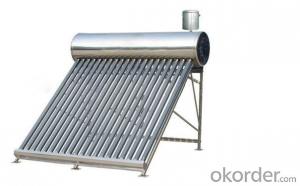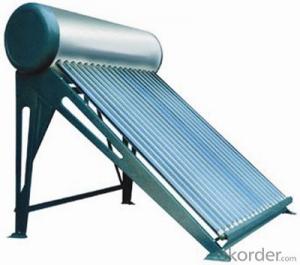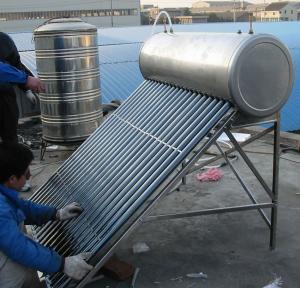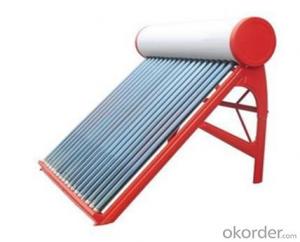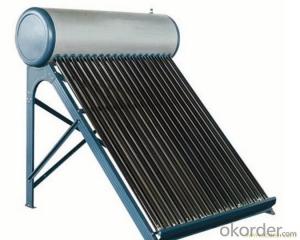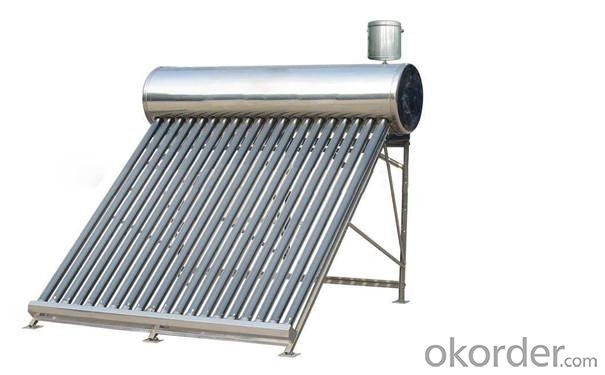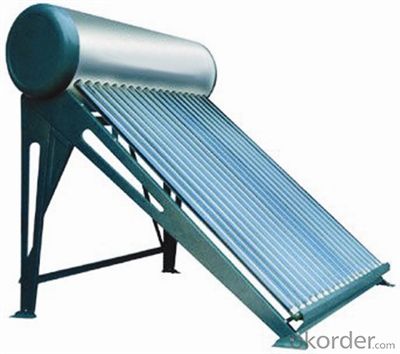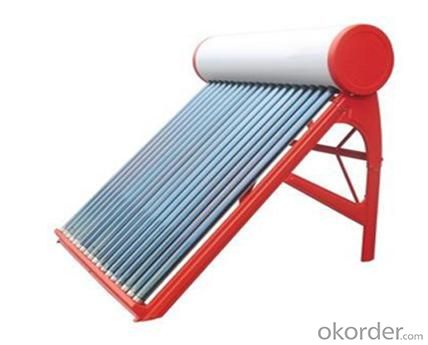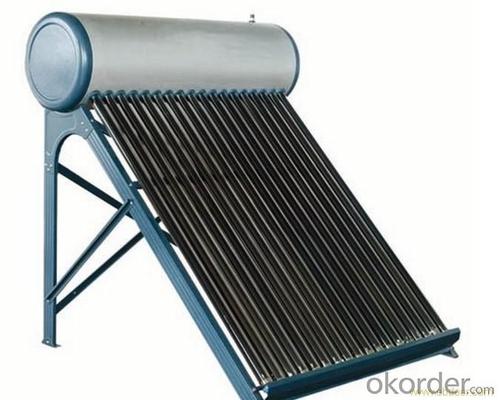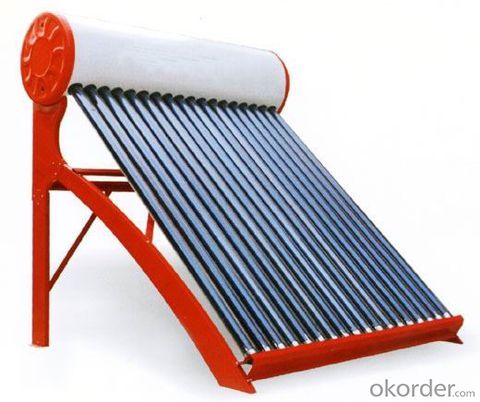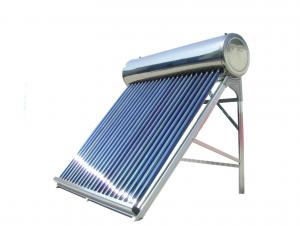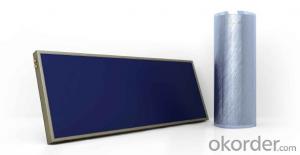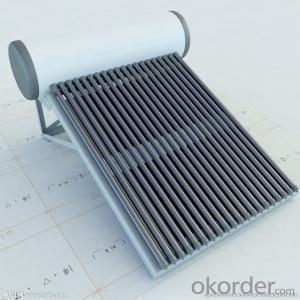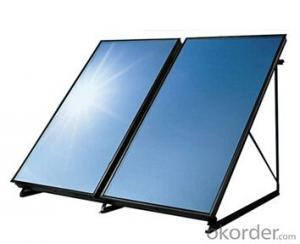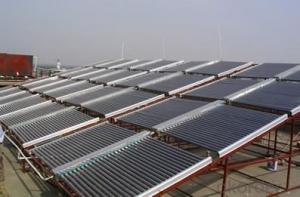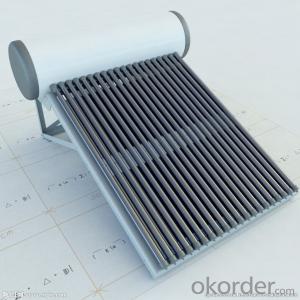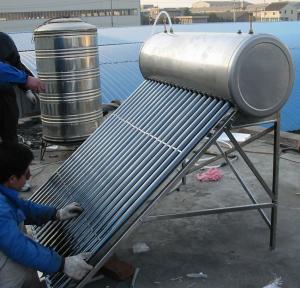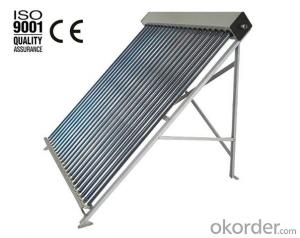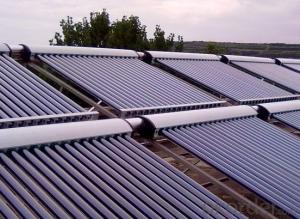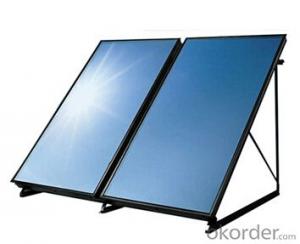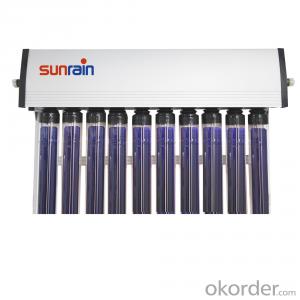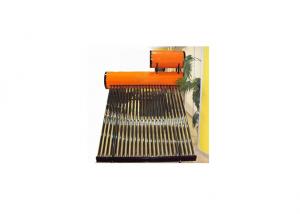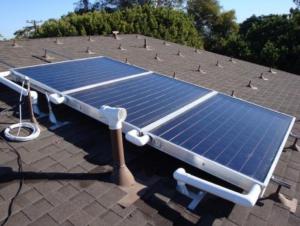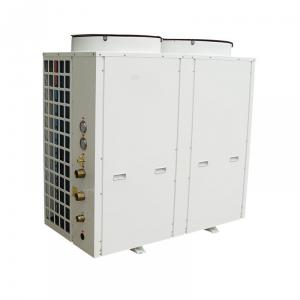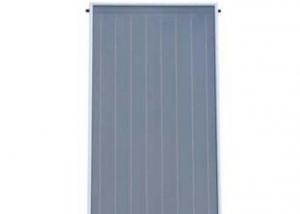Solar Water Heater Vacuum 30 Tube Solar Collector China Top Supplier
- Loading Port:
- China main port
- Payment Terms:
- TT OR LC
- Min Order Qty:
- 10 set
- Supply Capability:
- 10000 set/month
OKorder Service Pledge
OKorder Financial Service
You Might Also Like
Introduction of Non-Pressure Solar Water Heater:
Non-pressure Solar Heater is one of the most economical solar water heating device with pretty high efficiency at the same time. It consists of hot water storage tank, solar vacuum tubes with mouth plug in storage tank, and bracket supporting tank and tubes.When cold water in evacuated tubes is heated with solar irradiation, as the specific gravities of hot water and cold water are different, hotter water goes upward to storage tank and colder water goes downward to glass tubes. through this continuous circulation, the cold water in storage tank will be gradually heated till sunset.
Solar water heaters working principle
1. The solar collector absorbs solar energy and transmits it to the solar water heater tank through circulation
2. When the temperature of the collector reaches the set value, the controller starts the circulation pump automatically
3. The circulation pump makes heat-conducting liquid circulate automatically
4. The heat-conducting liquid transfers heat to water by lower heat exchanger in the water tank.
5. When the temperature difference between solar collector and heat pipe solar water heaters tank doesn't reach the set value, the circulation pump will be shut automatically
6. In case the temperature of the water tank does not reach Tmax, Electric Heating Element will start to work automatically
Solar water heaters working station component:
1. Operating screen
2. Manometer
3. Pump speed adjust switches
4. Temperature difference circulation pump
5. Flow rate indicator
6. Return circuit connector
7. Safety valve
8. Expansion vessel connector9. Return circuit connector
10. Wall mounting
11. Expansion vessel:8L
12. Pressure resistance: 10 bar pressure for expansion vessel
Solar water heaters specification:
Description | solar water heaters |
Material of out manifold | 0.55mm thickness color steel/ fluorine carbon steel |
Material of inner tank | Food grade 2.0 mm thickness SUS304 stainless steel |
Tank insulating layer | 40mm 45kg/m³ high-density polyurethane foamed |
Inlet and outlet hole | Male G1'' |
Max pressure | 0.6 Mpa |
Solar collector tube | 3.3 Borosilicate glass with N/Al coating |
Thickness of glass tube | 1.6mm |
Vacuum tube tightness | P≤0.005 Pa |
Absorption | as=0.93-0.96 (AM1.5) |
Emission ratio | εh=0.04-0.06 (80C±5C) |
Idle sunning property parameters | Y=220~260m2.C/KW |
Average heat loss coefficient | ULT=0.6~0.7W/(m2.C) |
Bracket: | 2.0mm thickness aluminum alloy |
Tank weight | 75KGS |
Tank size | 560mm Dia x 1810mm Height |
Tank capacity | 300L |
Solar collector | 2pcs 58x1800x15tube solar collector |
Absorber area | 2.811 m² |
Working station | SP116 working station |
Heat exchanger length | Upper:12m, Underside:18m |
Solar water heaters details show:
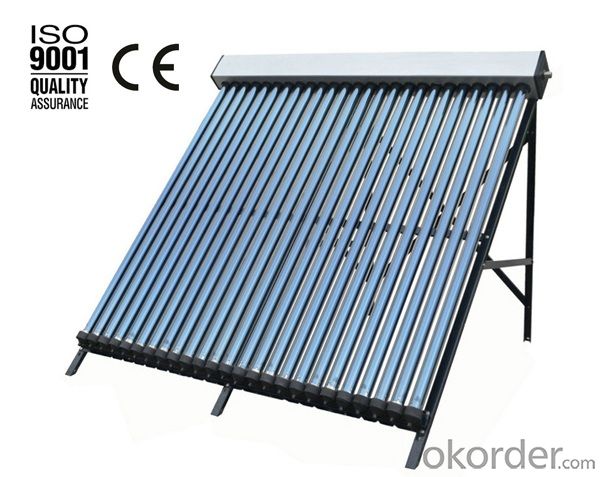
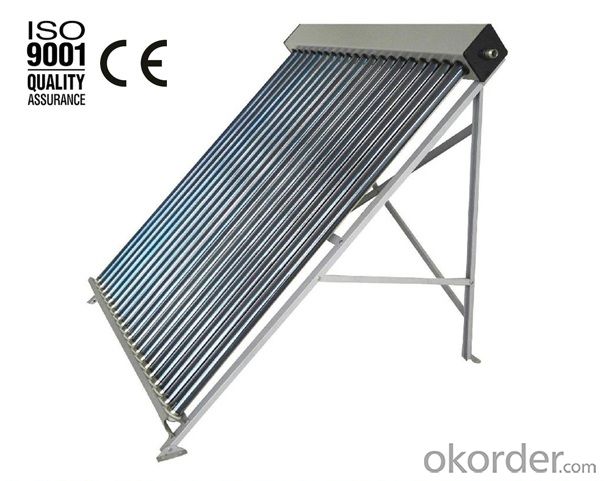
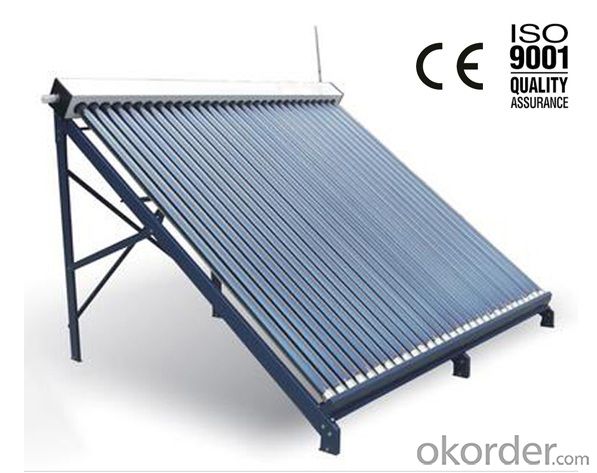
Benefits of this kind of solar water heaters:
1. Prolong the life of your existing water heater
2.Costs less than an electric, gas or oil water heater
3.No maintenance required
4.Lasts longer than a traditional hot water heater
5.Reduce your water heating costs
- Q: What is the impact of chemical water treatments on the performance of a solar water heater?
- The performance of a solar water heater can be influenced by chemical water treatments in both positive and negative ways. On the positive side, the use of chemical water treatments can effectively prevent the accumulation of mineral deposits and scale in the solar water heater system. This is crucial because these deposits can obstruct heat transfer surfaces and decrease the overall heat transfer rate, thus reducing the system's efficiency. By averting the formation of these deposits, chemical water treatments can effectively maintain the performance and efficiency of the solar water heater in the long run. Moreover, chemical water treatments can also serve to inhibit the growth of algae, bacteria, and other microorganisms within the system. These microorganisms have the potential to block water flow, clog pipes, and diminish the efficiency of the system. By employing chemical treatments, these issues can be minimized or eliminated altogether, resulting in enhanced performance and longevity of the solar water heater. Nevertheless, there can be negative consequences associated with chemical water treatments as well. Certain chemicals used in these treatments can corrode materials commonly found in solar water heater systems, such as copper or aluminum. Over time, this corrosion can lead to leaks, reduced lifespan of the system, and increased maintenance demands. Additionally, if the chemical water treatments are not properly monitored or maintained, they can cause chemical imbalances in the water. This can result in damage to the components of the solar water heater, decreased performance, and potentially unsafe water for domestic use. Therefore, it is of utmost importance to meticulously adhere to the manufacturer's recommendations, regularly test, and adjust the chemical levels to ensure proper balance and minimize any negative impact. To sum up, chemical water treatments can significantly impact the performance of a solar water heater. When utilized correctly, they can effectively prevent mineral deposits, scale, and microbial growth, resulting in improved efficiency and longevity of the system. However, it is crucial to exercise caution and diligently maintain the chemical balance in order to avoid any negative effects, such as corrosion or chemical imbalances.
- Q: Can a solar water heater be used in areas with high mineral content in water?
- Yes, a solar water heater can be used in areas with high mineral content in water. However, it is important to regularly maintain and clean the system to prevent mineral buildup and scale formation, which can reduce its efficiency.
- Q: How does the angle of the solar panels impact the performance of a solar water heater?
- The angle of the solar panels greatly affects the performance of a solar water heater. The optimal angle allows for maximum exposure to sunlight, ensuring efficient conversion of solar energy into heat. If the angle is too steep or shallow, it can result in decreased energy absorption and reduced heating efficiency. Finding the right angle is crucial to achieve optimal performance and maximize the output of the solar water heater.
- Q: Can a solar water heater be used in areas prone to hurricanes or tornadoes?
- Yes, a solar water heater can be used in areas prone to hurricanes or tornadoes. However, it is important to ensure that the system is designed and installed properly to withstand extreme weather conditions. Reinforcements and anchoring may be necessary to secure the solar water heater and prevent damage during high winds. Additionally, regular maintenance and inspections should be conducted to ensure the system remains in good working condition after severe weather events.
- Q: Are there any disadvantages of using a solar water heater?
- Yes, there are a few disadvantages to using a solar water heater. Firstly, the initial cost of installing a solar water heater can be higher compared to conventional water heaters. Additionally, the efficiency of a solar water heater can be affected by factors like weather conditions, location, and shading. This means that in areas with limited sunlight or during cloudy days, the performance may be reduced. Furthermore, solar water heaters require ample roof space for installation, which may not always be feasible for every household. Lastly, the maintenance and repair costs of solar water heaters can be higher compared to traditional systems.
- Q: How does the water hardness affect the performance of a solar water heater?
- Water hardness can affect the performance of a solar water heater by causing mineral deposits to form on the heating elements and inside the pipes. This can reduce the efficiency of the heater and potentially lead to clogs or blockages. Regular maintenance and descaling may be required to ensure optimal performance and prevent damage to the system.
- Q: Advantages and disadvantages of solar water heater
- Post cold phenomenon.4, in addition to rainy days, the use of solar water heaters do not need other costs, such as gas costs, electricityIn rainy weather, it is necessary to use auxiliary electric heating device, then you have to pay the electricity bill, in factIn rainy days, solar water heaters are still working, but the temperature of hot water can not reach the user washBath needs, but the water in the tank is warm, higher than ordinary tap water temperature, therefore, even ifIt is rainy day, it is also more than ordinary electric water heater.
- Q: What is the structure and principle of solar water heater?
- The working principle of solar water heater working principle diagram: DDZ (1), a endothermic processSolar radiation through the glass cover, the water along the fin and tube wall to transfer heat tube is absorbed by the collector. When the water in the heat absorbing pipe absorbs heat, the temperature is increased, and the specific gravity is reduced to rise. With the rising of water stored in the tank top, and at the same time of low temperature of the water circulating pipe, through this way, eventually FCL water rises to a certain temperature. Plate type current collector, basically use the combination of good combination of multiple methods, such as rolling or rolling method, the thermal resistance between the pipe and the water absorbing plate can be ignored. The main factors that affect the performance of plate heat exchanger plate, the first is the structure design,
- Q: What is the best location for installing a solar water heater?
- The best location for installing a solar water heater is typically on a south-facing roof or an open area with minimal shading throughout the day. This is because solar water heaters rely on sunlight to heat water, so maximizing sun exposure is crucial for optimal performance. Installing the system on a south-facing slope ensures that it receives the maximum amount of direct sunlight throughout the day. Additionally, it is important to consider the angle of the solar water heater. Ideally, the system should be tilted at an angle that corresponds to the latitude of the installation site to maximize solar energy absorption. However, this angle can be adjusted depending on the specific needs and requirements of the system. Furthermore, it is advisable to avoid installing the solar water heater in areas with heavy wind exposure or extreme weather conditions. Strong winds can potentially damage the system, and extreme weather can affect its performance and durability. Therefore, selecting a location that provides some level of protection from these elements is recommended. Lastly, it is crucial to ensure that the installation location provides easy access for maintenance and repairs. Regular maintenance is essential for the efficient and long-term operation of a solar water heater, so choosing a location that allows for easy accessibility will simplify the process. Overall, the best location for installing a solar water heater is a south-facing roof or open area with minimal shading, optimal sun exposure, protection from extreme weather conditions, and easy accessibility for maintenance purposes.
- Q: What is the average lifespan of a solar water heater in different regions?
- The average lifespan of a solar water heater can vary depending on the region. In general, a well-maintained solar water heater can last anywhere from 15 to 30 years. However, certain factors such as climate, water quality, installation quality, and maintenance practices can influence the lifespan. In regions with harsh weather conditions or high mineral content in the water, the lifespan may be shorter compared to regions with milder climates and better water quality.
Send your message to us
Solar Water Heater Vacuum 30 Tube Solar Collector China Top Supplier
- Loading Port:
- China main port
- Payment Terms:
- TT OR LC
- Min Order Qty:
- 10 set
- Supply Capability:
- 10000 set/month
OKorder Service Pledge
OKorder Financial Service
Similar products
Hot products
Hot Searches
Related keywords
